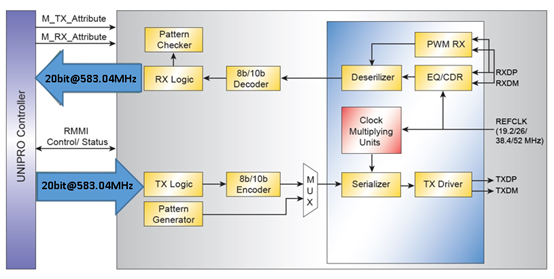MIPI M-PHY is a serial interface technology with high bandwidth capabilities, which is particularly developed for mobile applications to obtain low pin counts along with excellent power efficiency. As a MIPI Alliance contributor and leading Interface IP provider, M31 provides silicon-proven and low-power M-PHY in various process nodes. The M-PHY IP is optimized for UFS (Universal Flash Storage) applications, follows MIPI M-PHY v4.1 spec, supports a wide range of high-speed (HS) and low-speed (LS) data transfer, and complies with the RMMI interface for seamless integration with upside controllers. Moreover, M31 also provides various lane configurations for the M-PHY IP to meet different bandwidth requirements.

- IP Product Lists
- M-PHY v4.1 Features
- M-PHY v3.1 Features
- Supports RMMI interface for applications such as UNIPRO protocol (UFS, CSI-3, DSI-2)
- High speed gears, HS-G1A/B, HS-G2A/B, HS-G3A/B and HS-G4A/B with scalable power consumptions
- Low speed PWM Gears from G1 to G4 with ultra-low power consumptions
- Supports reference-less function during low-speed operation
- Common lane configuration facilitates the lane scalability
- Low latencies to switch to/from different power states
- Supports multiple signal amplitudes
- Supports internal loopback BIST functions for at-speed mass production testing
- Supports RMMI interface for applications such as UNIPRO protocol (UFS, CSI-3, DSI-2) and DigRF
- High speed gears, HS-G1A/B, HS-G2A/B and HS-G3A/B with scalable power consumptions
- Burst mode CDR with short sync length (< 16SI)
- Low speed PWM Gears from G1 to G4 with ultra-low power consumptions
- Supports reference-less function during low-speed operation
- Common lane configuration facilitates the lane scalability
- Low latencies to switch to/from different power states
- Supports multiple signal amplitudes
- Supports internal loopback BIST functions for at-speed mass production testing
- Certified with ASIL-B of ISO 26262






